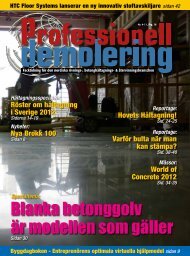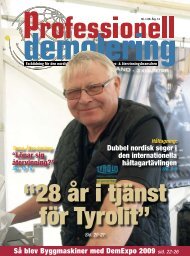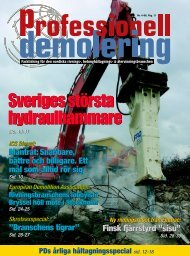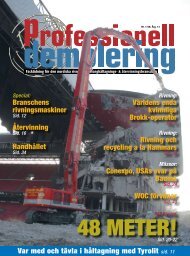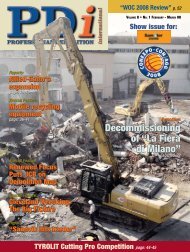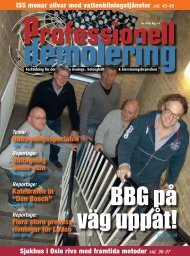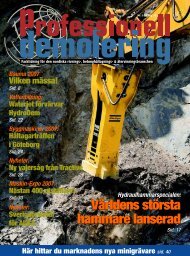Demolition In UAE! pages: 38-40 - Pdworld.com
Demolition In UAE! pages: 38-40 - Pdworld.com
Demolition In UAE! pages: 38-40 - Pdworld.com
Create successful ePaper yourself
Turn your PDF publications into a flip-book with our unique Google optimized e-Paper software.
“Brokking” th<br />
way forward<br />
High reach demolition with a Brokk<br />
hanging from a crane.<br />
PDi Editor Andrei<br />
Bushmarin recently<br />
met with one of<br />
Russia’s young<br />
demolition <strong>com</strong>panies<br />
Deconstruction North-<br />
West. The <strong>com</strong>pany<br />
was started in 2006<br />
and in a few years<br />
showed tremendously<br />
fast growth.<br />
Text: Andrei Bushmarin<br />
Photo: Deconstruction North-West<br />
Many captains of industry, be they from the North America,<br />
Europe or Asia, have expressed surprise at their Russian counterparts’<br />
young ages. It appears that vast fortunes and brilliant<br />
careers can be made much faster there than in the rest of the<br />
world. However, before jumping to any conclusions it should<br />
be recognised that this basically applies to those who started<br />
their careers in the 1990s. During that tumultuous, yet highly<br />
entrepreneurial decade, businesses sprouted like mushrooms<br />
after a downpour. When the Iron Curtain collapsed, a whole<br />
new generation of young and rigorous businessmen emerged,<br />
who began to import Western cutting-edge technologies into<br />
a country with the industrial base in a total shambles. The<br />
then Russia was awash with make-or-break opportunities for<br />
aspiring wheelers and dealers trying to make as much hay as<br />
possible while the pallid northern sun was shining.<br />
New millennium’s people<br />
Alexei Melnik and Alexei Kudryavtsev, who head St.Petersburgbased<br />
Deconstruction North-West, are young and both in their<br />
early 30s. Still, they were born just a few years too late to jump<br />
on the 90’s bandwagon. The other difference is that they have<br />
quite consciously chosen break over make and have no regrets.<br />
It was already six years into the new millennium, when the two<br />
launched their <strong>com</strong>pany dealing in Brokk robots and offering<br />
robotic demolition services in the northwestern part of Russia.<br />
Peculiarities of the<br />
national robotic demolition<br />
It is often said about Russia that it is a country that works in<br />
mysterious ways. This contention is highly debatable, but the<br />
way the Brokk business has gone there was just as special as one<br />
could have expected. While everywhere in the world construction<br />
has been, and remains, the main field of application for<br />
Brokk technology, in Russia it was steel mills and metallurgical<br />
plants that were first interested in robotic demolition. Thriving<br />
on high prices for steel and metals, they began to use Brokk<br />
robots to remove burnt-out linings from their furnaces. Russia’s<br />
construction society was largely unaware of robotic demolition,<br />
and Alexeis saw it as a promising niche.<br />
Having started out as a Brokk dealer in northwest Russia,<br />
The picture above shows the renovation of the Blagoveshchensky<br />
Bridge (former Lieutenant Schmidt Bridge) in<br />
St.Petersburg.<br />
they soon realized that performing demanding demolition jobs<br />
would be the best way to promote Brokk’s brand in the region.<br />
<strong>In</strong> the formative year of 2006, the <strong>com</strong>pany staff boasted just its<br />
two founders, also functioning as sales managers, a civil engineer<br />
and an operator of the only demonstration Brokk 180. By 2009<br />
Deconstruction North-West had sold 15 robots in St.Petersburg<br />
and increased the personnel several-fold.<br />
When asked about the attitude of Russian specifiers<br />
towards Brokk, the managers said that despite interest from<br />
engineering quarters known for their open-mindedness, there<br />
is still a lot of backward thinking in the industry. Even now,<br />
many demolition projects in Russia are designed with manual<br />
techniques in mind, and both specifiers and contractors are<br />
reluctant to ditch the conventional methods that they have<br />
been using for decades. Sometimes it takes much convincing<br />
to make the specifiers see that they save virtually nothing by<br />
using obsolete and often dangerous solutions.<br />
To remain <strong>com</strong>petitive and promote its cause, Deconstruction<br />
North-West has to do its Brokk jobs on the same price<br />
level as the manual demolishers. The technology’s efficiency<br />
and versatility help keep the operating costs down. As practice<br />
shows, Brokk is especially cost-effective when used together with<br />
other modern demolition methods like diamond cutting.<br />
Powerful, versatile and safe<br />
The old mentality may be dying hard but it is bound to go<br />
anyway. Deconstruction North-West has now solved enough<br />
difficult projects to prove Brokk’s superiority over timeconsuming<br />
and ineffective manual techniques. The most vivid<br />
example, perhaps, is the removal of the two top floors of a hotel<br />
in Vasilievsky Ostrov, one of the most original and romantic<br />
districts in St.Petersburg. On this job, the <strong>com</strong>pany worked<br />
alongside another demolition contractor. That <strong>com</strong>pany used<br />
dated impact methods, while Deconstruction North-West operated<br />
two Brokk 180 units. It was the modern-day approach of<br />
Deconstruction North-West that allowed its general contractor<br />
to <strong>com</strong>plete their half of the job two months ahead of their<br />
24 PDi • Is s u e 3 - 2009 • Au g - Se p t



